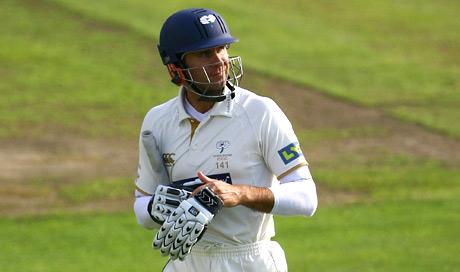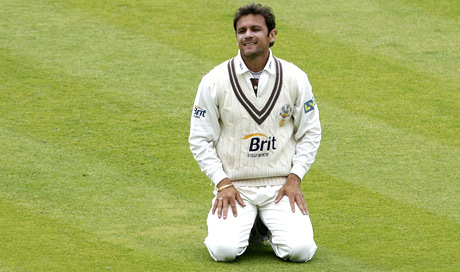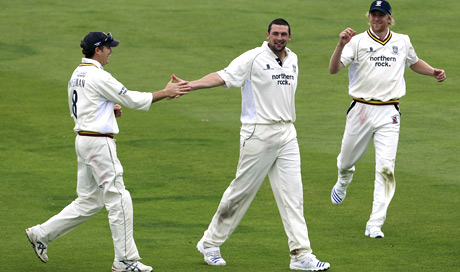Disciples are often the last to find peace. Graeme Hick seems to have long since put his modest Test career to bed, but his legions of fans are still troubled by the dirty laundry that has had once last significant airing in the last fortnight as Hick prepared for his retirement.
That a Test average of 31.32 represents failure for Hick, or for any batsman given 65 Tests, is beyond reasonable doubt, yet a jury coming to such a verdict might have 12 different reasons, or cite 12 different pieces of evidence, for doing so. Like consumption of Cadbury’s Creme Eggs, foreplay and curing hangovers, Hick produces a very personal response. What’s your take?
The truth is somewhere in the middle, with shades of grey blurring to form a picture of ultimate underachievement. As well as the variety of perceptions, there were significant paradoxes. Hick was perceived as mentally fragile, yet he cracked one-day cricket and overcame unprecedented circumstances to attain very goodness at Test level between 1993 and 1996. He became associated with the term ‘flat-track bully’, yet he was one of the gentlest, nicest fellows you could meet. He was seen as technically iffy against the short ball, yet played some of his most authoritative innings at the Oval and Perth (it was reverse swing that really got him in a mess). He was seen to cower miserably against hard-nosed pragmatists like Ray Illingworth and Merv Hughes, but he played his most productive Test cricket when Illingworth was coach and only got out to Hughes three times in six innings, never for under 20.
Some of Hick’s failings were his fault; many weren’t. Ultimately the collision of misfortune was too great for one who lacked the fortitude and the mongrel of the true sporting champion. This is not to say that he could have averaged, say, 40 over a 10-year Test career, which would have been worth 45 in today’s money. He would have had a greater chance of doing so had he stayed at No3, a position in which he averaged a reasonable 34.57 from 35 Test innings.
Like Ian Bell, who shares Hick’s peculiar mix of forcefulness and diffidence, the suspicion is that Hick would have been better shaping the play rather than reacting to it. England thought they were moving him out of the firing line by dropping him down the order, when in fact they were moving him into it: Hick frequently came in at 50 for three or 100 for four, a situation to which he was not temperamentally suited. Hick needed to bat in his bubble; to cause damage, not limit it.
In some senses, he was on a failed exercise in damage limitation before he had nicked a ball for England. The expectations of him were hideously unrealistic. There was the extended qualification period, which allowed bad technical habits – especially an unyielding front leg – to become ingrained and, even more damagingly, led to Hick becoming so immersed in the comfort zone that he struggled to acclimatise when he was ripped out of it.
There was also the build-up to Hick’s debut. In those days sports coverage was relatively sober, with less of the insufferable and incessant puff of Sky Sports News, but by the standards of the day the build-up to Hick’s debut was extreme. And of course, to utter the word Bradman, while inevitable, was also hugely irresponsible. That hype was suffocating to Hick – and the purest oxygen to Curtly Ambrose, who opened his lungs, embraced the challenge and put Hick back in his box.
Fate was always cruel to Hick: perhaps one of the millions of sixes he struck at Worcester broke not only windows but mirrors. He had his first series against the West Indies and a rampant Ambrose. He was dropped in 1993, despite scores of 178, 47, 68, 26, 34, 22, 20 and 64 in his previous eight Test innings. Mike Atherton infamously declared at Sydney in 1994-95 when Hick was 98 not out. When Hick played by some distance the greatest innings of his international career, a withering 141 against Donald, Pollock, Schultz McMillan and Matthews on a lively Centurion track in 1995-96, the game was washed out, and what would probably have been a matchwinning monologue became an aside. Even in 1998, when he and John Crawley were batting against Sri Lanka for a single place on the Ashes tour, Hick made a first-innings 107 only to have it trumped by Crawley’s 156. In isolation, such incidents would have been manageable; together they all scraped away at a flimsy self-esteem and, surely, persuaded Hick’s subconscious that it wasn’t meant to be. It brings to mind the quote in one of Tony Hancock’s suicide notes. “Things just went too wrong too many times.”
And yet, for a time, they went thrillingly right. There is a tendency to think of Hick’s Test career as a continuum of underachievement, but that is not really the case. It splits into three sections: his early struggles (18.90 from 13 Tests between 1991 and 1993), a largely happy middle (47.48 from 29 Tests in a three-year period from February 1993 to January 1996), and the tame, extended finale (18.85 from 23 Tests from 1996 to 2001). The middle period is an outlier, yet to many it is most representative of what Hick could and should have been.
Certainly, the feeling at the time was that he had cracked it. At the start of the summer of 1996, Wisden Cricket Monthly ran a cover story, entitled ‘Nearly There’, on his breakthrough. Ray Illingworth agreed. In his entry after that South African tour of 1995-96, he wrote: “He now looks more like the Hick who smashes county attacks all over the place, and I now believe he will go on to great things. I don’t like using the word ‘great’ too much, but Hick is now close to being in that bracket as a world-class batsman. He is just 30, so in the next few years he could achieve anything.”
Summer series at home to India and Pakistan, followed by winter trips to Zimbabwe and New Zealand, seemed a perfect time for Hick to cash in the chips he had earned by grafting so successfully against the West Indies, South Africa and Australia over the previous two years. Instead he got out in all manner of peculiar, almost surreal ways, and was dropped before the summer was out. It was then, rather than in 1991 or 1993 or 2000, that Hick’s career really hit the skids. It may not be an issue for him anymore, but the rest of us will always wonder.
Rob Smyth is a freelance journalist





